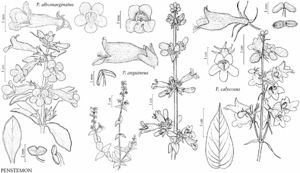Penstemon calycosus
Bull. Torrey Bot. Club 25: 470. 1898.
Herbs. Stems erect, (40–) 60–120 cm, puberulent, at least proximally, slightly glaucous or not. Leaves basal and cauline, basal often withering by anthesis, not leathery, glabrous; basal and proximal cauline 47–110 × 10–24 mm, blade oblanceolate, base tapered, margins entire or ± serrate, apex rounded to obtuse; cauline 3–7 pairs, sessile or proximals short-petiolate, (14–) 44–155 × (2–) 13–46 mm, blade lanceolate to ovate, proximals sometimes oblanceolate, base clasping or tapered, margins serrate, apex acute to acuminate. Thyrses interrupted, conic, (5–) 14–20 cm, axis sparsely puberulent and glandular-pubescent, rarely glabrous, verticillasters 2–5, cymes (1–) 5–15-flowered, 2 per node; proximal bracts ovate to lanceolate, sometimes linear, 13–80 × (2–) 5–32 mm, margins serrate, sometimes entire; peduncles and pedicels spreading to ascending, sparsely glandular-pubescent. Flowers: calyx lobes lanceolate, 5–9 × 0.8–1.9 mm, apex acuminate, sparsely glandular-pubescent; corolla pale lavender to violet, with faint violet nectar guides, ventricose, 20–35 mm, glandular-pubescent externally, ± white-pubescent internally abaxially, tube 5–7 mm, throat abruptly inflated, 8–11 mm diam., slightly 2-ridged abaxially; stamens included or longer pair reaching orifice, pollen-sacs opposite, navicular, 1.2–1.4 mm, dehiscing completely, connective splitting, sides glabrous, rarely sparsely pubescent, hairs white, to 0.2 mm, sutures papillate; staminode 11–13 mm, reaching orifice, 0.2–0.3 mm diam., tip straight to slightly recurved, distal 2–5 mm sparsely pubescent, hairs yellowish, to 1 mm; style 14–16 mm. Capsules 7–8 × 4–5 mm, glabrous. 2n = 96.
Phenology: Flowering May–Jun.
Habitat: Woodlands, meadows, rocky slopes, stream banks.
Elevation: 10–300 m.
Distribution
Ont., Ala., Conn., D.C., Ga., Ill., Ind., Ky., Maine, Md., Mass., Mich., Minn., Mo., N.J., N.Y., N.C., Ohio, Pa., R.I., S.C., Tenn., Vt., Va.
Discussion
Penstemon calycosus is concentrated in the Central Lowlands and Interior Low Plateaus; occurrences farther south and east, especially in New England, may be from introductions (F. W. Pennell 1935). The range lies almost entirely within that of P. digitalis, but historic ranges of both P. calycosus and P. digitalis are difficult to delimit due to both past and continuing introduction and spread of both species. Calyx lobe lengths to 12 mm are reported in the literature; those appear to be from fruiting calyces. Penstemon calycosus usually has glabrous anthers, but many specimens, especially from Illinois and Ohio, bear hairs on the adaxial surfaces of the anthers. Some populations from this region exhibit variation in vegetative (leaf size and bract shape and margins) and floral characters (calyx lobe shape and size, corolla color, and anther pubescence), suggesting possible hybridization with P. digitalis, an observation that would be consistent with the findings of A. C. Koelling (1964).
Selected References
None.
Lower Taxa
"/4+timescorollathroat" is not declared as a valid unit of measurement for this property.
